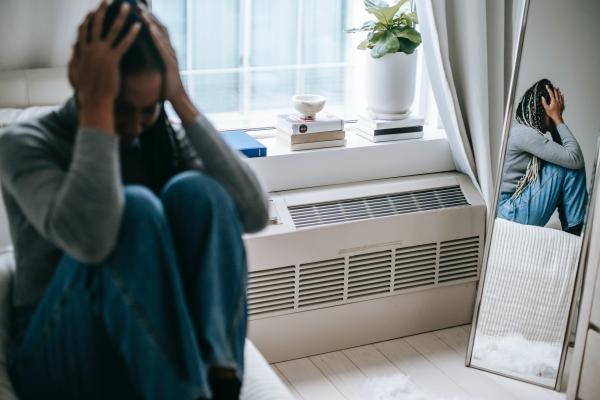Post-traumatic stress disorder
If you experience something scary or shocking (a trauma) and do not process it properly, you can develop post-traumatic stress disorder.
There is so much sadness, fear and anger stuck in me. Those memories keep haunting me. It overwhelms me. I’m never at ease anymore.

Did you know this?
Post-traumatic stress disorder (PTSD) is a mental health condition that may occur after a traumatic event. It can also occur after repeated and extreme exposure to the details of traumatic events. Around 10 per cent of people who experience trauma develop PTSD. It can occur at any age and is thought to affect between 0.5 and 1 per cent of European adults. PTSD occurs twice as often in women as in men. The symptoms also last longer in women.
Traumatic events
Traumatic events can be human induced like war, terrorism, assaults and car accidents, or they can be caused by natural disasters like earthquakes, bushfires and floods. These events are usually very different to any challenges we’ve had before, and they can be very hard to come to terms with and process in our minds.
Traumatic events can be shocking and overwhelming and often cause fear, sadness, anger and grief. These symptoms are all natural and part of our natural human response to danger. Over time, with support from family and friends, we start to make sense of what’s happened. These feelings usually fade and we recover.
Post-traumatic stress disorder (PTSD) differs from regular stress or trauma in that the symptoms are persistent and ongoing. Around 10% of people who experience trauma develop PTSD. People with PTSD usually show a significant change in behavior, mood, and thoughts immediately after a trauma. However, they can also manifest with a delay of several months or even years. And the greater the magnitude of the trauma, the greater the risk for developing PTSD.
How does PTSD affect us?
PTSD has four groups of symptoms:
-
Re-experiencing the trauma. PTSD is characterised by the involuntary re-experiencing of painful memories of the trauma. This can be images, thoughts or observations, such as hearing sounds or perceiving smells. It may occur during waking hours but is more common during nightmares. The re-experiences or flashbacks are very realistic in nature and can therefore be as threatening as the original traumatic situation. You may start to sweat, shake and breathe faster.
-
Avoiding reminders of the event. In an attempt to get back to life and protect yourself from strong emotions, you consciously try to avoid thoughts, memories or conversations about the trauma.
-
Negative changes in thoughts and mood. Negative feelings and thoughts associated with the psychotraumatic event can take different forms. For example, there is the inability to remember anything about the event. Very often, negative beliefs or expectations about yourself ('I am bad'), others or the world ('I can't trust anyone' or 'the world is dangerous') develop. Or distorted thoughts about the cause or effect of the trauma emerge, leading you to blame yourself or others.
-
Feeling ‘on edge’ and overly aroused. The trauma can also make you hyper-vigilant, touchy-feely and jumpy. You are more likely to be frightened by unexpected noises or movements and may react more sharply to people around you (e.g. with outbursts of anger). You also often experience concentration and sleep problems (such as difficulty falling asleep or restless sleep), which can lead to overtiredness.
Severe consequences
PTSD has a huge impact on your social life and your body, but also on your relationships and your functioning at college or university. You might start to be very irritable or angry which can be hard on your family. Persistent negative feelings and the reduced interest or participation in activities you previously enjoyed, can cause you to isolate yourself from others and make it difficult to experience positive emotions such as happiness, satisfaction or feelings of love.
PTSD is often accompanied by other psychological disorders such as depression, anxiety disorders, impulsive behaviour, self-harming behaviour or substance abuse.
Talk about it
Have you experienced a traumatic event and are you feeling overwhelmed? Then it is important that you find peace and support in your own environment. Talking about it can help. Talk to someone you trust and feel comfortable with, such as a good friend or family member.
If you find this difficult, try talking to someone who is familiar with similar experiences. This could be your GP or someone from student services at your college or university.

Would you rather tell your story anonymously? Then you can go to Awel (102 or awel.be) or Tele-Onthaal (106 or tele-onthaal.be). If you are thinking about suicide or have questions about it, contact the Suicide Line (1813 or zelfmoord1813.be).
I'm lucky because I get so much pleasure from my schoolwork, my cats, going out for a walk. Simple, little things which make me feel like I did something good today.
Seek help
There are effective treatments for PTSD, and you can recover. It is therefore important to seek professional support. The most important thing in dealing with PTSD is not to ignore the signs and symptoms and to seek professional help in processing the experience. There are several effective treatments to stabilise the symptoms and to process the traumatic event. Depressive symptoms or other psychological disorders can make processing the psychotrauma more difficult. That is why, in consultation with your GP, medication can sometimes be started.
In addition to individual therapy, there are also various forms of group therapy. Recognition and acknowledgement are of great value here: group members support each other and thus strengthen the notion that they are not alone.
Worried about someone?
Have you noticed that a friend suffers from stress after a shocking event or behaves differently? Then talk about it and share your concern. Try to be understanding and listen without judgment.
Keen to learn, read or hear more about this topic?
Podcasts
Self-help
- Helpline 1712 - for questions concerning any form of violence or abuse.
- Nu praat ik erover - chat box for minors and adults who have questions about or are victims of abuse, neglect or sexual violence (Dutch)
TED Talks and videos
Websites
- Via zelfhulp.be you can contact fellow victims. (Dutch)
Powerful stories
You are not alone. Get inspired by other students' stories about vulnerability and doubt. But above all about the power of connectedness.
Go to the stories